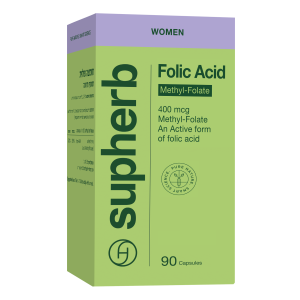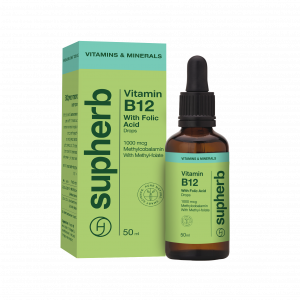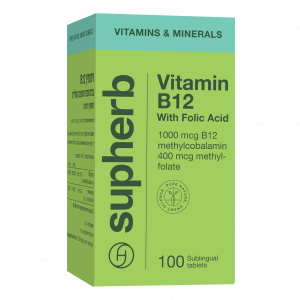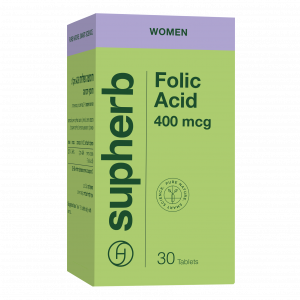- Home
- Vitamins & Minerals
- Folic Acid (Vitamin B9) – Not Just for Women!
Folic Acid (Vitamin B9) – Not Just for Women!
- Folic acid is important for the cell division process, creating red blood cells and fetus development in the early stages of pregnancy.
- Folic acid deficiency might lead to anemia and symptoms such as weakness, dizziness, accelerated heartbeat and hair loss.
- Folic acid, in its methyl folate form, is better than the synthetic form common in supplements, since it’s the vitamin’s active from.
Everyone needs folic acid!
Although mostly affiliated with women, everyone needs folic acid! Yes, men as well, at any age. You might say that it’s important for us even before we’re born, from insemination. Why is it always discussed in relation to women, then and is there folic acid supplements for mem? Everything you need to know about folic acid, why it’s important to our health and what happens when there’s a deficit. You can find all the answers here.
What is folic acid?
Folic acid is part of the B vitamins group and is also known as vitamin B9, but more commonly as folic acid. It’s crucial for our health, at all stages, from cell insemination and division of fir fetal cells in the womb.
Folic acid plays an important role in cell division process (DNA replication), it takes part in the red blood cell production process and is essential for the proper development of the baby in its first few weeks. These are its three main roles, and as a result it’s important for the proper functioning of various bodily systems, such as the immune system, nervous system, digestive system and skin.
Folic acid in food
Natural folic acid is called folate and can be found in various animal and plant-based foods. The origin of the name folate is from the Latin word folium, which means ‘leaves’ since it was initially taken from spinach leaves.
There are plenty of foods that contain folic acid in plants: Green, leafy vegetables such as spinach, lettuce, cabbage, mustard leaves, citrus, avocado, legumes, nuts and almonds; and in animal-based products, such as eggs, liver, meat and fish.
Even though it can be found in many foods, you should know it doesn’t last long, mostly when cooked, but not just. The way we store the food as well as various processing ways, such as milling flour and storing it, can damage it since its sensitive to heat, light and dry conditions.
Notice! Natural folic acid in foods isn’t wholly absorbed in the body and isn’t a substitute for taking a folic acid supplement in women before or during pregnancy.
Folic acid deficiency: Health factors and consequences
While nutrition low on folic acid is the main source for folic acid deficiency, a deficiency in other nutritional components – such as protein or B vitamins – might also lead to its deficit, since they’re involved in its absorption process. Alcohol intake also damages folic acid absorption and increases its evacuation from the body, and the same goes for an over-intake of coffee. Absorption issues might even lead to folic acid deficit in addition to other nutritional deficits.
Folic acid deficiency in the body might lead to anemia, since the red blood cells production process is damaged. Symptoms that may occur in this case are fatigue, exhaustion, a sense of sluggishness, hair loss, headaches, rapid heartrate, tongue pain, digestion issues, restlessness, confusion and more.
vitamin B12 article
Folic acid for women
It’s old news that folic acid is well-known and discussed mostly when it comes to feminine matters, since it effects the initial fetal stages, the lack of which can cause neonatal defects.
Since folic acid is needed so early on, even before the woman knows she’s pregnant, women have to maintain it proper levels by taking supplements.
The official recommendation by healthcare organization around the world relates to taking the supplement throughout the fertile years, since not all pregnancies are planned, or for the very least in the first three months before getting pregnant and in the first trimester. The recommended daily dosage of folic acid for women is 400 mcg per day. This recommendation is for everyone, regardless of nutrition or blood tests. There are unique situations in which a physician would recommend a higher dosage.
Folic acid in adults: When you need nutritional supplementation
Folic acid deficit can be traced by a blood test, in which nutritional supplementation is in order. The best and most efficient way to reach proper levels are by taking a supplement.
The nutritional supplements market have two main types of folic acid, and you should know the difference between the two. Most of the supplements contain the synthetic “folic acid” derivative, which should be further processed in the body in order to become active. The second type of folic acid supplements contain the methyl folate derivative, which is in fact the active form that doesn’t need any further processing, and therefore has an advantage!
Folic acid men – is it a thing?
This question comes up quite a lot in men who are looking for folic acid supplement, as they encounter folic acid supplements labeled ‘folic acid for women’ and wonder whether they have to search for a different supplement. In this case, the answer is ‘No’; they’re exactly the same! A man in need for folic acid supplement can take one that’s ‘for women’, it’s completely fine.
If you’re asking yourselves why the supplements are for women, the answer is simple: The need for raising awareness in women, and there’s actually no difference between folic acid for men and for women. The only difference between the supplements could be to the form of vitamin in them (folic acid or folate) or their dosage.
Why is a folate supplement considered better?
As previously mentioned, folic acid in nutritional supplements come in one of the following two forms: ‘folic acid’ – which is synthetic – and folate, which is the natural form of the vitamin. There’s no difference between them in terms of body absorption, they vary in another way that most of us are unaware of: The body’s ability to convert it to the its active from. This process is usual in most people, but not everyone. Turns out that some of the population has a genetic difference that effects the enzyme responsible for this process, which keeps them from converting it to its available and active form.
In actuality, only a special genetic test done privately can tell you which part of the population you belong to, but this I unusual and you should choose a methyl folate supplement to begin with.
Folic acid surplus
Folic acid in its active folate derivative is also considered safe in relatively high dosages, and any excess is flushed through the urinary system. However, you shouldn’t consume more than 800-1,000 mcg per day, unless a physician specifically instructed it. an excess of folic acid might cause vitamin B12 deficiency screening.
In short: Everything you need to know
- Folic acid (vitamin B9) is important for everyone – men and women alike – at any age and any stage in life. Its importance and necessity as a supplement increase in fertile women.
- There’s no difference between folic acid for men and women, it’s a branding that wishes to increase awareness in women.
- It’s recommended to eat fruits and vegetables high in natural folic acid, especially fresh, green leaves that have a lot of it. Since it’s heat, light and dryness sensitive, you should store the fruits and vegetables in the fridge and eat them fresh. Remember, cooking ruins it.
- Natural folic acid from food isn’t completely absorbed in the body and is therefore not a substitute for folic acid supplement for women before and during pregnancy.
- When it comes to choosing a supplement, it’s always better to choose natural folic acid, in its active and available from, which will appear in the ingredients as methyl folate.
- Since it belongs to the B vitamins it often appears in different complexes and multivitamins, including prenatal ones, but in that case you should also make sure that folate appears in its ingredients.
The Supherb team
















